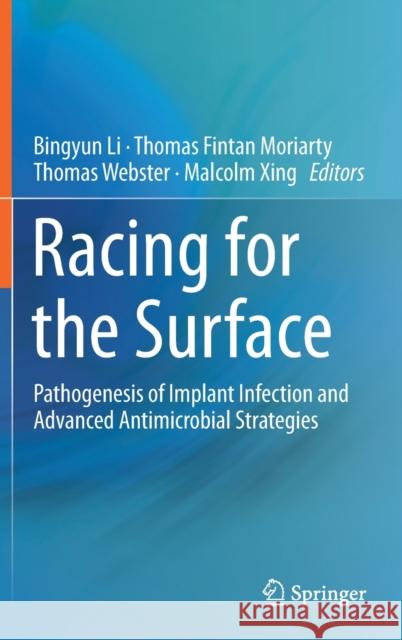Racing for the Surface: Pathogenesis of Implant Infection and Advanced Antimicrobial Strategies » książka



Racing for the Surface: Pathogenesis of Implant Infection and Advanced Antimicrobial Strategies
ISBN-13: 9783030344740 / Angielski / Twarda / 2020 / 650 str.
Racing for the Surface: Pathogenesis of Implant Infection and Advanced Antimicrobial Strategies
ISBN-13: 9783030344740 / Angielski / Twarda / 2020 / 650 str.
(netto: 575,06 VAT: 5%)
Najniższa cena z 30 dni: 578,30
ok. 16-18 dni roboczych.
Darmowa dostawa!
Insights into the emergence, clinical prevalence and significance of Staphylococcus aureus small colony variants.- Periprosthetic Joint Infection.- Complications in orthopedic trauma surgery: fracture related infection.- Chiral Stereochemical Strategy for Antimicrobial Adhesion.- Perspectives on and need to develop new infection control strategies.- Battling bacteria with free and surface-immobilized polymeric nanostructures.- Engineering Approaches to Create Antibacterial Surfaces on Biomedical Implants and Devices .- 3D Printed Ceramic-Polymer Composites for Treating Bone Infection.- Bioinspired interfaces for the management of skin infections.- Antimicrobial endodontic materials.- Local Delivery of Anti-biofilm Therapeutics.- Device-Related Infections.- Advances in polysaccharide based antimicrobial delivery vehicles.- Antibacterial Coatings on Medical Implants.- Perspectives on biomaterial-associated infection: pathogenesis and current clinical demands.- Polymeric Nanoparticulate Delivery Vehicles of Antimicrobials for Biofilm Eradication.- Pathogenesis of biomaterial-associated infection.- Metal- and Polymer-Based Nanoparticles for Advanced Therapeutic and Diagnostic System Applications.- Antimicrobial Material in Arthroplasty.- Antimicrobial Hydrogels: Key Considerations and Engineering Strategies for Biomedical Applications.- Antibacterial Polymeric and Peptide Gels/Hydrogels to Prevent Biomaterial-related Infections.- The Impact of Bacterial Biofilms in Transfusion Medicine.- Mechanisms of Action and Chemical Origins of Biologically Active Antimicrobial Polymers.- When the Race is Lost: The Clinical Impact of Prosthetic Joint Infections.- Antibacterial Hydroxyapatite: An Effective Approach to Cure Infections in Orthopedics.- Index.
Bingyun Li is a full Professor with tenure at School of Medicine, West Virginia University. He is a Fellow of the American Institute for Medical and Biological Engineering and an Associate Editor of the Frontiers in Microbiology journal. Professor Li is a member of the Society for Biomaterials (SFB), Orthopedic Research Society (ORS), American Society for Microbiology (ASM), Materials Research Society (MRS), American Chemical Society (ACS), International Chinese Musculoskeletal Research Society (ICMRS), and Chinese Association for Biomaterials (CAB). Professor Li has served as topic chair of Infection and Inflammation of the ORS Program Committee, vice-chair and chair of Orthopedic Biomaterials Special Interest Group of SFB, Chief Editor of ICMRS Newsletter, and inaugural treasurer of CAB. Professor Li’s research focuses on advanced materials, nanomedicine, infection, immunology, and drug delivery. He has published two edited books, 102 articles, 133 abstracts, and 14 provisional/full patents. Professor Li has given 56 invited and keynote talks and has received multiple prestigious awards including the Berton Rahn Prize from AO Foundation, the Pfizer Best Scientific Paper Award from Asia Pacific Orthopedic Association, and the Collaborative Exchange Award from Orthopedic Research Society.
Dr Fintan Moriarty is Principal Investigator and Leader of the Musculoskeletal Infection team at the AO Research Institute Davos in Switzerland. He has extensive expertise in the application of preclinical in vivo models to address clinically relevant questions on the problem of fracture-related infection (FRI). Particular interests have been the development of prophylactic and therapeutic strategies against FRI, including those caused by antibiotic resistant pathogens. He has published over 60 peer-reviewed articles and book chapters, and has served as editor of a book on biomaterial associated infection. He is a scientific editor of the eCM Journal, co-organiser of the eCM conference on orthopedic infection, and guest lecturer at the Department Health Science and Technology (D-HEST) of the ETH Zurich.
This book covers the latest research in biofilm, infection, and antimicrobial strategies in reducing and treating musculoskeletal, skin, transfusion, implant-related infections, etc. Topics covered include biofilms, small colony variants, antimicrobial biomaterials (antibiotics, antimicrobial peptides, hydrogels, bioinspired interfaces, immunotherapeutic approaches, and more), antimicrobial coatings, engineering and 3D printing, antimicrobial delivery vehicles, and perspectives on clinical impacts. Antibiotic resistance, which shifts the race toward bacteria, and strategies to reduce antibiotic resistance, are also briefly touched on. Combined with its companion volume, Racing for the Surface: Pathogenesis of Implant Infection and Advanced Antimicrobial Strategies, this book bridges the gaps between infection and tissue engineering, and is an ideal book for academic researchers, clinicians, industrial engineers and scientists, governmental representatives in national laboratories, and advanced undergraduate students and post-doctoral fellows who are interested in infection, microbiology, and biomaterials and devices.
1997-2026 DolnySlask.com Agencja Internetowa
KrainaKsiazek.PL - Księgarnia Internetowa









